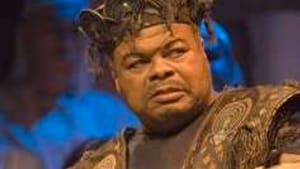Stay in the Loop
BSR publishes on a weekly schedule, with an email newsletter every Wednesday and Thursday morning. There’s no paywall, and subscribing is always free.
Beyond Leontyne Price: For whom the black operatic bell tolls
Can black opera save Classical music?

Everyone loves Gershwin's Porgy and Bess, I noted last year in BSR. (See "Black opera: Struggle and strategy.") But I asked: Will white audiences ever expand their listening menu to operas by black composers? And how can black musicians help push the envelope?
Anthony Davis's 2010 opera X— based on the life of Malcolm X— was a great success for the New York City Opera, but it hasn't been revived. His opera Amistad focused on the same slave ship rebellion that inspired the Steven Spielberg film. According to Davis, schoolchildren who attended his Amistad preferred it to the movie. Yet today Davis is mostly writing chamber works.
This problem has lately been reinforced by the ludicrous notion that the age of great black opera singers— which began with Marian Anderson and extended through Leontyne Price, Grace Bumbry, Shirley Verrett, Kathleen Battle, Jessye Norman, Leona Mitchell and Simon Estes— is over. Denyce Graves is probably as close to a household name as you can find today in this category.
This is absurd, as I discovered while listening to the abundance of gorgeous performances during the recent convention of the African American Art Song Alliance. Listen, for example, to Donnie Ray Albert as Amonasro in Verdi's Aida on YouTube and tell me he isn't one of the world's great bass-baritones.
Misguided boycotts
This problem isn't just about black people. As I sat in that small theater listening to a parade of stunning performers, I felt privileged— not as a black woman, but as a lover of serious music.
What's a black singer or composer to do about an issue that affects all serious music lovers?
Judith Anne Still, daughter of the composer William Grant Still, proposed one misguided solution to the dearth of black opera singers last year when she called on black singers to boycott performances of Porgy and Bess. The black composer Adolphus Hailstork proposed a different solution recently to the Art Song Alliance. Since the gatekeepers of the opera world aren't interested in works that reflect our history, he said, black composers and singers need to redefine opera itself.
Why, for example, does an opera need to be a long production with elaborate lighting, costumes and an orchestra? Where you have a pianist, a singer or two, and a dramatic conflict, he argued, you have an opera. The whole experience could last forty minutes.
In effect, Hailstork argued, why should black composers and singers wait passively to be recognized by the musical establishment— especially at a time when classical music is struggling, and especially given the widespread (if false) notion that African-Americans don't like classical music?
Why not churches?
To this, Richard Thompson— a brilliant jazz and classical pianist, whose works reflect his varied influences— added: Why limit opera to opera houses? Why not perform operas in urban schools and churches? (Thompson's very traditionally staged opera about the black writer Paul Laurence Dunbar, The Mask in the Mirror, will premiere on August 4, presented by Trilogy Opera of Newark, N.J.)
While it remains to be seen if anyone will put these ideas into practice, they're certainly overdue.
But the question remains: Even if black composers write mini-operas, who is going to want to see them?
Much of the blame for this quandary lies with the decline of music education in public schools. As the legendary tenor George Shirley reminded us at the convention, during the Renaissance music was considered a science, integral to developing a fully formed adult. The same schoolchildren who enjoyed Anthony Davis's Amistad could grow into an enthusiastic audience for all kinds of classical music, not just works by black composers— if only they were exposed to it.
Jazz themes and video games
It helps that younger black composers aren't afraid to incorporate influences from outside the European classical tradition into their operas. X requires jazz musicians; Amistad contains sections that are downright funky. Davis even wrote a piece based on a video game.
This sort of experimentation isn't new. Porgy and Bess owes its continuing popularity in part to the inclusion of the "slave vernacular" in recent revivals. Some older composers fear that incorporating popular music and unorthodox forms into opera somehow devalues the product. But there's no reason for artificial separations between musical categories.
Big venues and reviews in big newspapers are nice. But big newspapers are being replaced by smaller and more numerous Internet websites. By the same token, bringing small productions to the people is the way forward. The ivory tower needs to be dismantled, or the people living inside it will starve.♦
To read responses, click here.
Anthony Davis's 2010 opera X— based on the life of Malcolm X— was a great success for the New York City Opera, but it hasn't been revived. His opera Amistad focused on the same slave ship rebellion that inspired the Steven Spielberg film. According to Davis, schoolchildren who attended his Amistad preferred it to the movie. Yet today Davis is mostly writing chamber works.
This problem has lately been reinforced by the ludicrous notion that the age of great black opera singers— which began with Marian Anderson and extended through Leontyne Price, Grace Bumbry, Shirley Verrett, Kathleen Battle, Jessye Norman, Leona Mitchell and Simon Estes— is over. Denyce Graves is probably as close to a household name as you can find today in this category.
This is absurd, as I discovered while listening to the abundance of gorgeous performances during the recent convention of the African American Art Song Alliance. Listen, for example, to Donnie Ray Albert as Amonasro in Verdi's Aida on YouTube and tell me he isn't one of the world's great bass-baritones.
Misguided boycotts
This problem isn't just about black people. As I sat in that small theater listening to a parade of stunning performers, I felt privileged— not as a black woman, but as a lover of serious music.
What's a black singer or composer to do about an issue that affects all serious music lovers?
Judith Anne Still, daughter of the composer William Grant Still, proposed one misguided solution to the dearth of black opera singers last year when she called on black singers to boycott performances of Porgy and Bess. The black composer Adolphus Hailstork proposed a different solution recently to the Art Song Alliance. Since the gatekeepers of the opera world aren't interested in works that reflect our history, he said, black composers and singers need to redefine opera itself.
Why, for example, does an opera need to be a long production with elaborate lighting, costumes and an orchestra? Where you have a pianist, a singer or two, and a dramatic conflict, he argued, you have an opera. The whole experience could last forty minutes.
In effect, Hailstork argued, why should black composers and singers wait passively to be recognized by the musical establishment— especially at a time when classical music is struggling, and especially given the widespread (if false) notion that African-Americans don't like classical music?
Why not churches?
To this, Richard Thompson— a brilliant jazz and classical pianist, whose works reflect his varied influences— added: Why limit opera to opera houses? Why not perform operas in urban schools and churches? (Thompson's very traditionally staged opera about the black writer Paul Laurence Dunbar, The Mask in the Mirror, will premiere on August 4, presented by Trilogy Opera of Newark, N.J.)
While it remains to be seen if anyone will put these ideas into practice, they're certainly overdue.
But the question remains: Even if black composers write mini-operas, who is going to want to see them?
Much of the blame for this quandary lies with the decline of music education in public schools. As the legendary tenor George Shirley reminded us at the convention, during the Renaissance music was considered a science, integral to developing a fully formed adult. The same schoolchildren who enjoyed Anthony Davis's Amistad could grow into an enthusiastic audience for all kinds of classical music, not just works by black composers— if only they were exposed to it.
Jazz themes and video games
It helps that younger black composers aren't afraid to incorporate influences from outside the European classical tradition into their operas. X requires jazz musicians; Amistad contains sections that are downright funky. Davis even wrote a piece based on a video game.
This sort of experimentation isn't new. Porgy and Bess owes its continuing popularity in part to the inclusion of the "slave vernacular" in recent revivals. Some older composers fear that incorporating popular music and unorthodox forms into opera somehow devalues the product. But there's no reason for artificial separations between musical categories.
Big venues and reviews in big newspapers are nice. But big newspapers are being replaced by smaller and more numerous Internet websites. By the same token, bringing small productions to the people is the way forward. The ivory tower needs to be dismantled, or the people living inside it will starve.♦
To read responses, click here.
Sign up for our newsletter
All of the week's new articles, all in one place. Sign up for the free weekly BSR newsletters, and don't miss a conversation.

 Maria Thompson Corley
Maria Thompson Corley